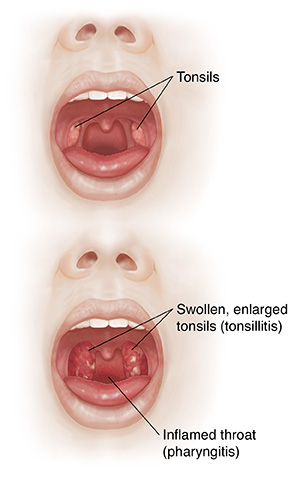When You Have a Sore Throat
A sore throat can be painful. There are many reasons why you may have a sore throat. Your healthcare provider will work with you to find the cause of your sore throat. They'll also find the best treatment for you.

What causes a sore throat?
Sore throats can be caused or made worse by:
-
Cold or flu viruses
-
Bacteria
-
Irritants, such as tobacco smoke or air pollution
-
Acid reflux (acid from your stomach comes up into your throat)
A healthy throat
The tonsils are on the sides of the throat near the base of the tongue. They are part of the immune system and collect viruses and bacteria and help fight infection. The throat (pharynx) is the passage for air. Mucus from the nasal cavity also moves down the passage.
An inflamed throat
The tonsils and pharynx can become inflamed due to a cold or flu virus. Postnasal drip (excess mucus draining from the nasal cavity) can irritate the throat. It can also make the throat or tonsils more likely to be infected by bacteria. Severe, untreated tonsillitis in children or adults can cause a pocket of pus (abscess) to form near the tonsil.
Your evaluation
A health evaluation can help find the cause of your sore throat. It can also help your healthcare provider choose the best treatment for you. The evaluation may include a health history, physical exam, and diagnostic tests.
Health history
Your healthcare provider may ask you:
-
How long has the sore throat lasted and how have you been treating it?
-
Do you have any other symptoms, such as body aches, fever, or cough?
-
Does your sore throat keep coming back (recur)? If so, how often? How many days of school or work have you missed because of a sore throat?
-
Do you have trouble eating or swallowing?
-
Have you been told that you snore or have other sleep problems?
-
Do you have bad breath?
-
Do you cough up bad-tasting mucus?
Physical exam
During the exam, your healthcare provider checks your ears, nose, and throat for problems. They also check for swelling in the neck, and may listen to your chest.
Possible tests
Other tests you may have include:
-
A throat swab to check for bacteria, such as streptococcus (the bacteria that causes strep throat)
-
A blood test to check for certain infections. These may include mononucleosis (a viral infection).
-
A chest X-ray to rule out pneumonia, especially if you have a cough
Treating a sore throat
Treatment depends on many factors. What's the likely cause? Is the problem recent? Does it keep coming back? In many cases, the best thing to do is to treat the symptoms, rest, and let the problem heal itself. Antibiotics may help clear up some bacterial infections. For cases of severe or recurring tonsillitis, the tonsils may need to be removed.
Easing your symptoms
-
Don’t smoke, and stay away from secondhand smoke.
-
For children, try throat sprays or frozen ice pops. Adults and older children may try lozenges.
-
Drink warm liquids to soothe the throat and help thin mucus. Stay away from alcohol, spicy foods, and acidic drinks, such as orange juice. These can irritate the throat.
-
Gargle with warm saltwater ( 1 teaspoon of salt to 8 ounces of warm water).
-
Use a humidifier to keep air moist and ease throat dryness.
-
Try over-the-counter pain relievers, such as acetaminophen or ibuprofen. Use as directed, and don’t take more than the advised dose. Don’t give aspirin to a child younger than age 19 unless directed by the child’s healthcare provider. Taking aspirin can put your child at risk for Reye syndrome. This is a rare but very serious disorder. It most often affects the brain and liver, and can cause death.
Are antibiotics needed?
If your sore throat is due to a bacterial infection, antibiotics may speed healing and prevent complications. Strep throat (group A streptococcus) is the major treatable infection for a sore throat. But strep throat causes only 5% to 15% of sore throats in adults who get medical care. Most sore throats are caused by cold or flu viruses. And antibiotics don’t treat viral illness. In fact, using antibiotics when they’re not needed may lead to bacteria that are harder to kill. Your healthcare provider will prescribe antibiotics only if they think they're likely to help.
If antibiotics are prescribed
Take the medicine exactly as directed. Be sure to finish your prescription even if you’re feeling better. Ask your healthcare provider or pharmacist what side effects are common and what to do about them.
Is surgery needed?
In some cases, tonsils need to be removed. This is often done as same-day (outpatient) surgery. Your healthcare provider may advise removing the tonsils in cases of:
-
Several severe bouts of tonsillitis in a year. Severe episodes include those that lead to missed days of school or work, or that need to be treated with antibiotics.
-
Tonsillitis that causes breathing problems during sleep
-
Tonsillitis caused by food particles collecting in pouches in the tonsils (cryptic tonsillitis)
When to call your healthcare provider
Call your healthcare provider right away if any of these occur:
-
Problems swallowing
-
Symptoms get worse, or you have new symptoms
-
The pain is bad enough to keep you from drinking liquids
-
You have a skin rash or hives, which could be an allergic reaction to antibiotics
-
Symptoms don’t get better within a week
-
Symptoms don’t get better within 2 to 3 days of starting antibiotics
Call 911
Call 911 right away if any of these occur:
-
Swollen tonsils cause trouble breathing or problems catching your breath
-
Skin is blue, purple, or gray in color
-
Trouble talking
-
Feeling dizzy or faint
-
Feeling of doom